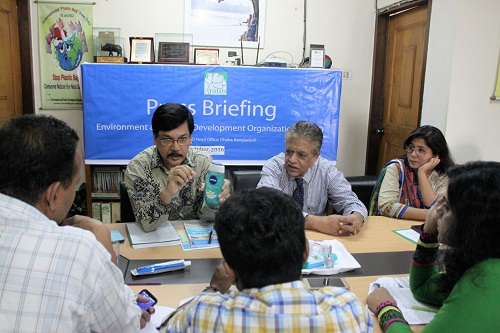Microbeads, an Emerging Health Threat and Environmental Pollutant.

15 October, 2016: Microbeads are being used as scrubbing and exfoliating agent in our personal care products such as face wash, scrub, and toothpaste replacing traditional and herbal scrubs. These microbeads are washed down from our bathroom to the water bodies. Around 7928.02 billion microbeads go to the rivers, canals and other water bodies in Dhaka, Chittagong and Sylhet cities in every month. Environment and Social Development Organization –ESDO published the study report entitled “Microbeads! Unfold Health Risk and Environmental Pollutant” which revealed the information about these health and environment threatening pollutants. Syed Marghub Murshed, former Secretary of the People’s Republic of Bangladesh and Chairperson of ESDO disclosed the report in a press briefing yesterday in Dhaka.
Mirobeads are plastic particles less than 1mm in size that can be spherical or irregular in shape and produced in a multitude of colors. The types of plastic most commonly used as microbeads are: polyethylene (PE), polymethyl methacrylate (PMMA), nylon, polyethylene terephthalate (PET) and polypropylene (PP).Sewage treatment plants are not equipped to remove particles that are small. Fish can confuse them as eggs or zooplankton and accidentally ingest them, which ultimately end up in human bodies. Microbeads being small in size have a large surface area by volume. As a result, they accumulate toxic contaminants. Consumption of these toxic chemicals may cause liver toxicity and disrupt the endocrine system. Microbeads in beauty products and toothpaste can be harmful to skin and teeth accordingly.
Alarming information was found that three major cities of Bangladesh, Dhaka, Chittagong and Sylhet city dwellers release a huge quantity of microbeads every month. 6628.46 billions of microbeads from Dhaka, 1087.18 billion of microbeads from Chittagong and 212.38 billion of microbeads from Sylhet city are dumped in to the water bodies and wetland. The huge microbeads content will highly cost the environment and human health by causing heart disease, type-2 diabetes, cancer, obesity in human body, small tears in skin leaving it vulnerable to bacteria and by accumulating toxic contaminants – persistent organic pollutants.
ESDO team collected and analyzed 60 most popular and commonly used products from different areas of Dhaka, Chittagong and Sylhet. Six categories of samples were collected, i.e. Detergent, face Wash, body wash, nail polish, toothpaste, face and body scrub and microbeads were separated from those samples. A questionnaire survey was done on 1800 people to determine the level of awareness among manufacturers and consumers. Among all the products, facewash are found to be mostly used by the consumers. About 95% consumers do not have any idea about the harmful impact of microbeads on health and environment. When they were given the idea of the fate of microbeads, half of them decided to switch from microbeads to safer, natural alternatives. When ESDO study team reached the retailers, they found that about 92% of the retailers are ignorant about this plastic pollutant but 40% said that they will remain conscious about selling those products. To know the level of pollution in water body, about 100 fish samples of 5 species (i.e, Catfish, Rui, Catla, Mrigal, Illish, Sarputi) were collected from the different water bodies of Dhaka, Chittagong and Sylhet and study findings show that larger fishes such as Rui are found to be more contaminated than smaller fishes such as Sarputi. On the other hand, fishes of Dhaka city were found to contain high content of microbeads and the fishes of Sylhet were found to contain least amount of microbeads in their body.


